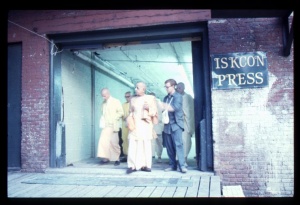SB 1.17.4: Difference between revisions
m (1 revision(s)) |
(Vanibot #0020: VersionCompareLinker - added a link to the Version Compare feature) |
||
| Line 1: | Line 1: | ||
{{info | {{info | ||
|speaker= | |speaker=Sūta Gosvāmī | ||
|listener= | |listener=Sages of Naimiṣāraṇya | ||
}} | }} | ||
[[Category:Srimad-Bhagavatam - Canto 01 Chapter 17|S04]] | |||
[[Category:Bhagavatam Verses Spoken by Suta Gosvami - Vanisource|011704]] | |||
<div style="float:left">'''[[Srimad-Bhagavatam]] - [[SB 1|First Canto]] - [[SB 1.17: Punishment and Reward of Kali|Chapter 17: Punishment and Reward of Kali]]'''</div> | |||
<div style="float:right">[[File:Go-previous.png|link=SB 1.17.3]] '''[[SB 1.17.3]] - [[SB 1.17.5]]''' [[File:Go-next.png|link=SB 1.17.5]]</div> | |||
{{CompareVersions|SB|1.17.4|SB 1965|SB 1972-77}} | |||
{{RandomImage}} | |||
==== TEXT 4 ==== | ==== TEXT 4 ==== | ||
<div class="verse"> | |||
<div | :papraccha ratham ārūḍhaḥ | ||
papraccha ratham ārūḍhaḥ | :kārtasvara-paricchadam | ||
kārtasvara-paricchadam | :megha-gambhīrayā vācā | ||
megha-gambhīrayā vācā | :samāropita-kārmukaḥ | ||
samāropita-kārmukaḥ | |||
</div> | </div> | ||
| Line 18: | Line 23: | ||
==== SYNONYMS ==== | ==== SYNONYMS ==== | ||
<div class="synonyms"> | |||
<div | ''papraccha''—inquired; ''ratham''—chariot; ''ārūḍhaḥ''—seated on; ''kārtasvara''—gold; ''paricchadam''—embossed with; ''megha''—cloud; ''gambhīrayā''—exonerating; ''vācā''—sound; ''samāropita''—well equipped; ''kārmukaḥ''—arrows and bow. | ||
</div> | </div> | ||
| Line 26: | Line 30: | ||
==== TRANSLATION ==== | ==== TRANSLATION ==== | ||
<div class="translation"> | |||
<div | |||
Mahārāja Parīkṣit, well equipped with arrows and bow and seated on a gold-embossed chariot, spoke to him [the śūdra] with a deep voice sounding like thunder. | Mahārāja Parīkṣit, well equipped with arrows and bow and seated on a gold-embossed chariot, spoke to him [the śūdra] with a deep voice sounding like thunder. | ||
</div> | </div> | ||
| Line 34: | Line 37: | ||
==== PURPORT ==== | ==== PURPORT ==== | ||
<div class="purport"> | |||
<div | |||
An administrative head or king like Mahārāja Parīkṣit, with full majestic authority, well equipped with weapons to chastise miscreants, can challenge the agents of the age of Kali. Then only will it be possible to counteract the degraded age. And in the absence of such strong executive heads, there is always disruption of tranquillity. The elected show-bottle executive head, as representative of a degraded public, cannot be equal with a strong king like Mahārāja Parīkṣit. The dress or style of royal order does not count. It is one's actions which are counted. | An administrative head or king like Mahārāja Parīkṣit, with full majestic authority, well equipped with weapons to chastise miscreants, can challenge the agents of the age of Kali. Then only will it be possible to counteract the degraded age. And in the absence of such strong executive heads, there is always disruption of tranquillity. The elected show-bottle executive head, as representative of a degraded public, cannot be equal with a strong king like Mahārāja Parīkṣit. The dress or style of royal order does not count. It is one's actions which are counted. | ||
</div> | </div> | ||
__NOTOC__ | |||
<div style="float:right; clear:both;">[[File:Go-previous.png|link=SB 1.17.3]] '''[[SB 1.17.3]] - [[SB 1.17.5]]''' [[File:Go-next.png|link=SB 1.17.5]]</div> | |||
__NOTOC__ | |||
__NOEDITSECTION__ | |||
Revision as of 10:07, 25 May 2020

A.C. Bhaktivedanta Swami Prabhupada
TEXT 4
- papraccha ratham ārūḍhaḥ
- kārtasvara-paricchadam
- megha-gambhīrayā vācā
- samāropita-kārmukaḥ
SYNONYMS
papraccha—inquired; ratham—chariot; ārūḍhaḥ—seated on; kārtasvara—gold; paricchadam—embossed with; megha—cloud; gambhīrayā—exonerating; vācā—sound; samāropita—well equipped; kārmukaḥ—arrows and bow.
TRANSLATION
Mahārāja Parīkṣit, well equipped with arrows and bow and seated on a gold-embossed chariot, spoke to him [the śūdra] with a deep voice sounding like thunder.
PURPORT
An administrative head or king like Mahārāja Parīkṣit, with full majestic authority, well equipped with weapons to chastise miscreants, can challenge the agents of the age of Kali. Then only will it be possible to counteract the degraded age. And in the absence of such strong executive heads, there is always disruption of tranquillity. The elected show-bottle executive head, as representative of a degraded public, cannot be equal with a strong king like Mahārāja Parīkṣit. The dress or style of royal order does not count. It is one's actions which are counted.